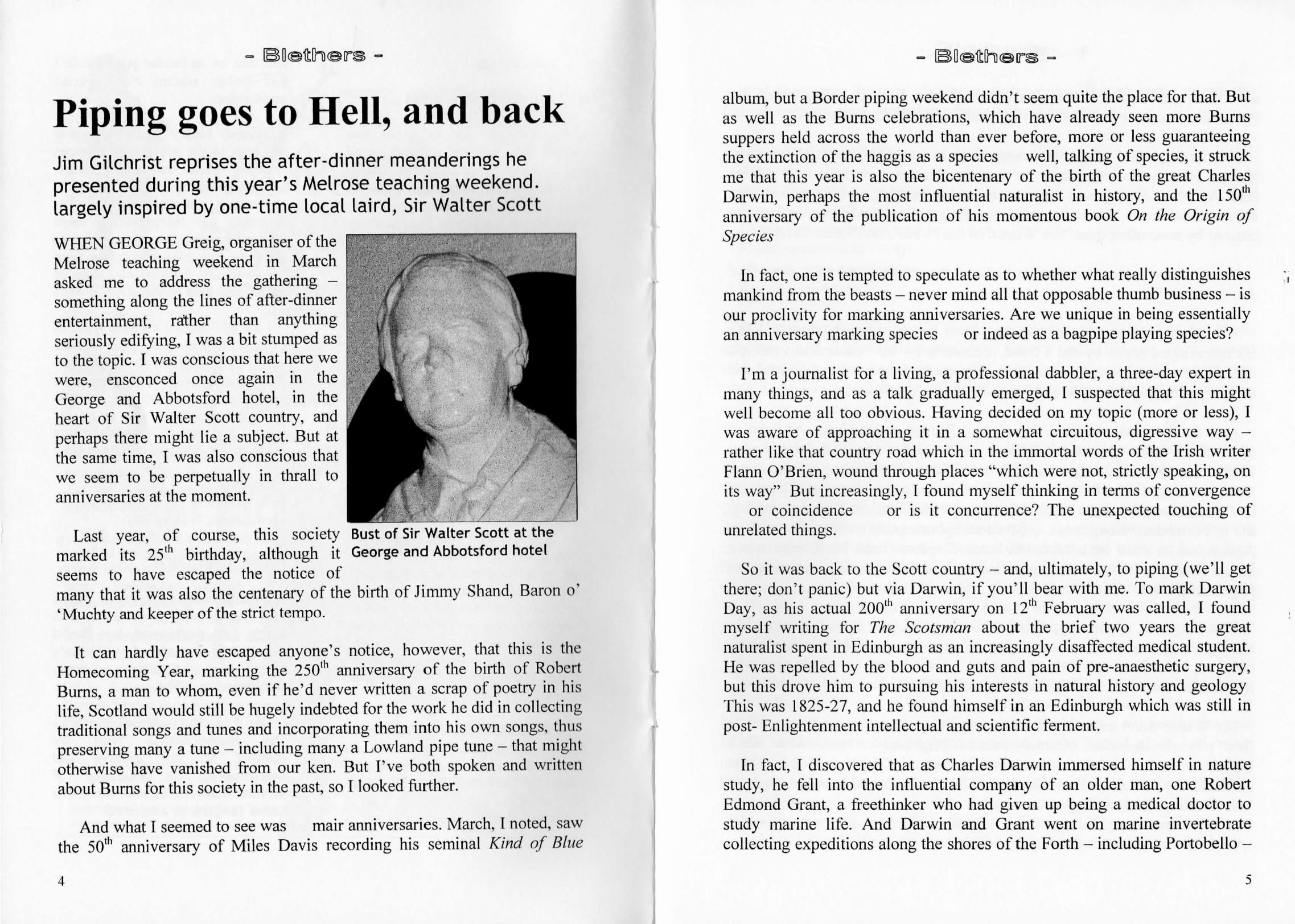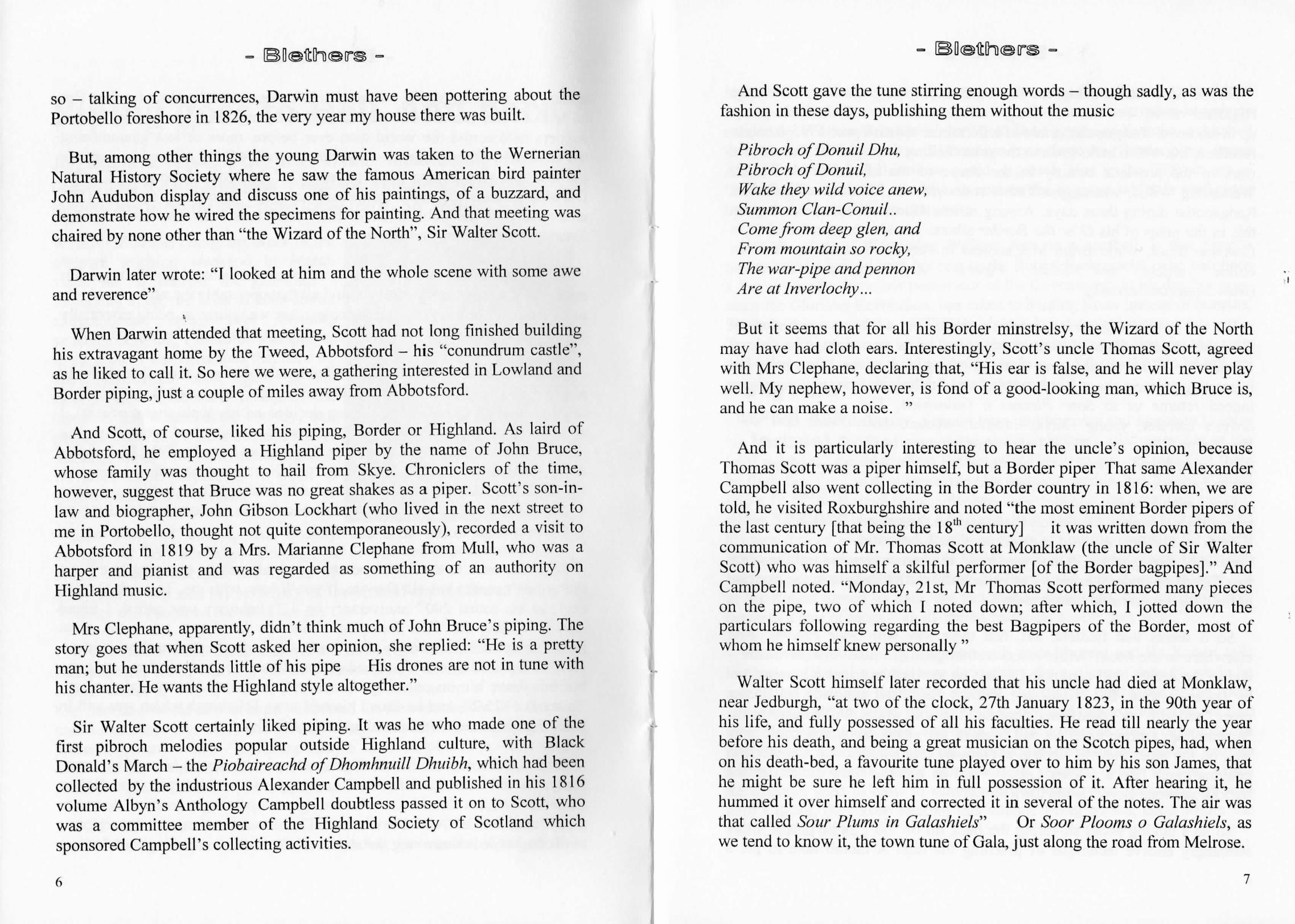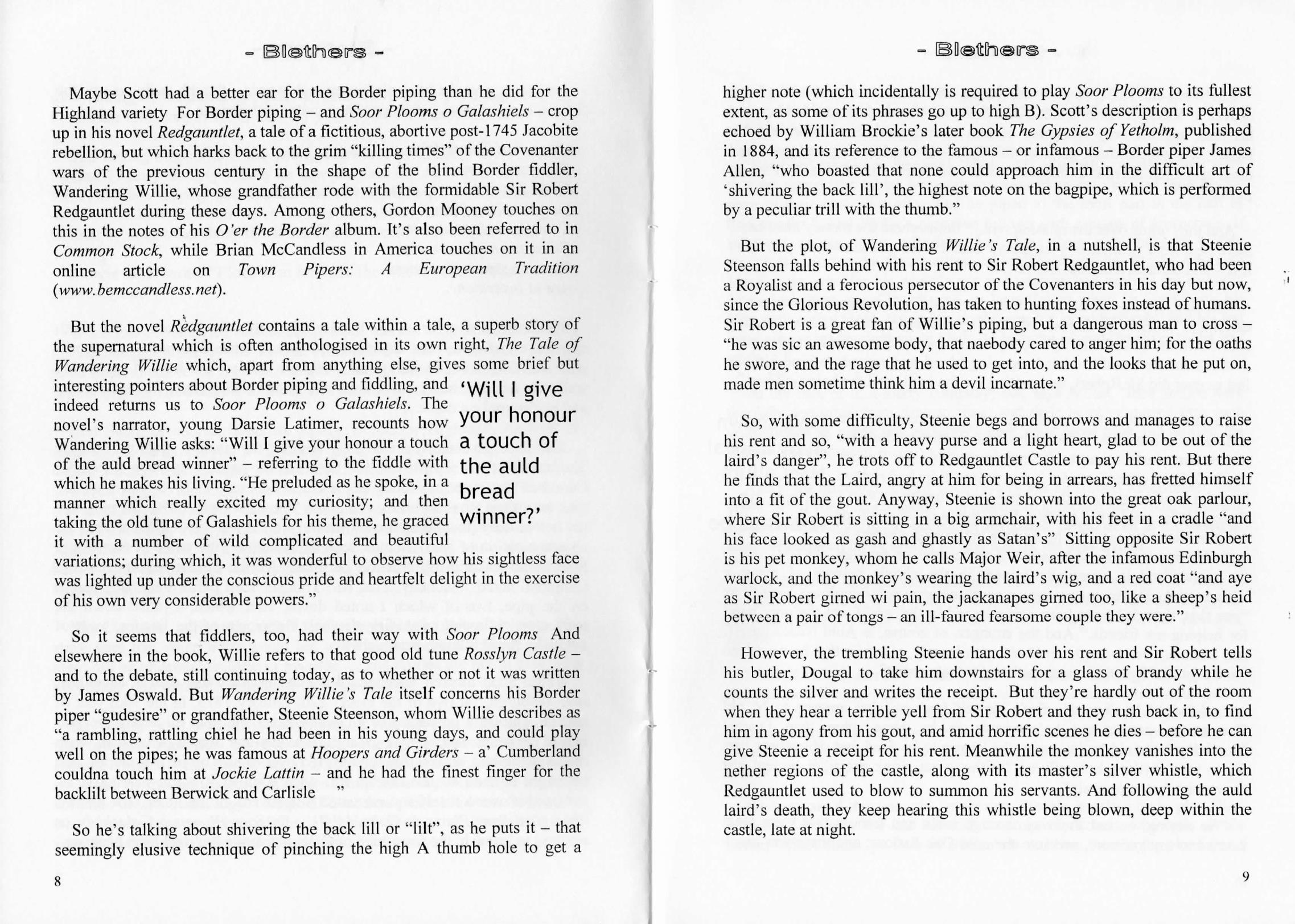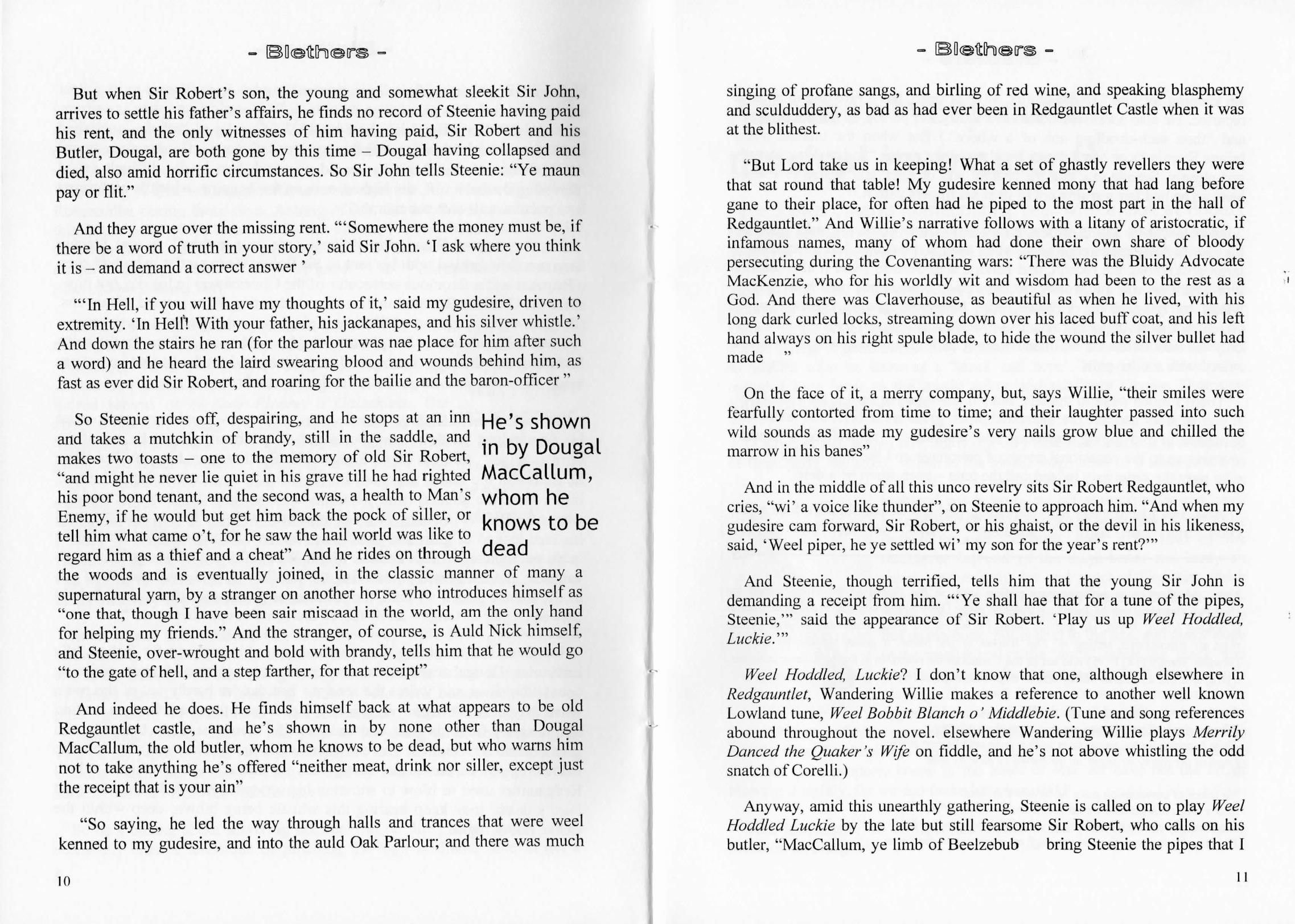Piping Goes to Hell and Back




Piping goes to Hell, and back
Jim Gilchrist reprises the after-dinner meanderings he presented during this year's Melrose teaching weekend, largely inspired by one-time local laird, Sir Walter Scott
WHEN GEORGE Greig, organiser of the Melrose teaching weekend in March asked me to address the gathering - something along the lines of after-dinner entertainment, rather than anything seriously edifying, I was a bit stumped as to the topic. I was conscious that here we were, ensconced once again in the George and Abbotsford hotel, in the heart of Sir Walter Scott country, and perhaps there might lie a subject. But at the same time, I was also conscious that we seem to be perpetually in thrall to anniversaries at the moment.
Last year, of course, this society marked its 25th birthday, although it seems to have escaped the notice of many that it was also the centenary of the birth of Jimmy Shand, Baron o' ‘Muchty and keeper of the strict tempo.
It can hardly have escaped anyone's notice, however, that this is the Homecoming Year, marking the 250th anniversary of the
birth of Robert Burns, a man to whom, even if he'd never written a scrap of poetry in his life, Scotland would still be hugely indebted for the work he did in collecting traditional songs and tunes and incorporating them into his own songs, thus preserving many a tune — including many a Lowland pipe tune — that might otherwise have vanished from our ken. But I've both spoken and written about Burns for this society in the past, so I looked further.
And what I seemed to see was mair anniversaries. March, I noted, saw the 50th anniversary of Miles Davis recording his seminal Kind of Blue album, but a Border piping weekend didn't seem quite the place for that. But as well as the Burns celebrations, which have already seen more Burns suppers held across the world than ever before, more or less guaranteeing the extinction of the haggis as a species well, talking of species, it struck me that this year is also the bicentenary of the birth of the great Charles Darwin, perhaps the most influential naturalist in history, and the 150th anniversary of the publication of his momentous book On the Origin of Species.
In fact, one is tempted to speculate as to whether what really distinguishes mankind from the beasts - never mind all that opposable thumb business - is our proclivity for marking anniversaries. Are we unique in being essentially an anniversary marking species or indeed as a bagpipe playing species?
I'm a journalist for a living, a professional dabbler, a three-day expert in many things, and as a talk gradually emerged, I suspected that this might well become all too obvious. Having decided on my topic (more or less), I was aware of approaching it in a somewhat circuitous, digressive way - rather like that country road which in the immortal words of the Irish writer Flann O'Brien, wound through places “which were not, strictly speaking, on its way” But increasingly, I found myself thinking in terms of convergence or coincidence or is it concurrence? The unexpected touching of unrelated things.
So it was back to the Scott country - and, ultimately, to piping (we'll get there; don't panic) but via Darwin, if you'll bear with me. To mark Darwin Day, as his actual 200th anniversary on 12th February was called, I found myself writing for The Scotsman about the brief two years the great naturalist spent in Edinburgh as an increasingly disaffected medical student. He was repelled by the blood and guts and pain of pre-anaesthetic surgery, but this drove him to pursuing his interests in natural history and geology This was 1825- 27, and he found himself in an Edinburgh which was still in post-Enlightenment intellectual and scientific ferment.
In fact, I discovered that as Charles Darwin immersed himself in nature study, he fell into the influential company of an older man, one Robert Edmond Grant, a freethinker who had given up being a medical doctor to study marine life. And Darwin and Grant went on marine invertebrate collecting expeditions along the shores of the Forth - including Portobello - so - talking of concurrences, Darwin must have been pottering about the Portobello foreshore in 1826, the very year my house there was built.
But, among other things the young Darwin was taken to the Wernerian Natural History Society where he saw the famous American bird painter John Audubon display and discuss one of his paintings, of a buzzard, and demonstrate how he wired the specimens for painting. And that meeting was chaired by none other than “the Wizard of the North”, Sir Walter Scott.
Darwin later wrote: “I looked at him and the whole scene with some awe and reverence”.
When Darwin attended that meeting, Scott had not long finished building his extravagant home by the Tweed, Abbotsford - his “conundrum castle”, as he liked to call it. So here we were, a gathering interested in Lowland and Border piping, just a couple of miles away from Abbotsford.
And Scott, of course, liked his piping, Border or Highland. As laird of Abbotsford, he employed a Highland piper by the name of John Bruce, whose family was thought to hail from Skye. Chroniclers of the time, however, suggest that Bruce was no great shakes as a piper. Scott's son-in-law and biographer, John Gibson Lockhart (who lived in the next street to me in Portobello, thought not quite contemporaneously), recorded a visit to Abbotsford in 1819 by a Mrs. Marianne Clephane from Mull, who was a harper and pianist and was
regarded as something of an authority on Highland music.
Mrs Clephane, apparently, didn't think much of John Bruce's piping. The story goes that when Scott asked her opinion, she replied: “He is a pretty man; but he understands little of his pipe. His drones are not in tune with his chanter. He wants the Highland style altogether.”
Sir Walter Scott certainly liked piping. It was he who made one of the first pibroch melodies popular outside Highland culture, with Black Donald's March - the Piobaireachd of Dhomhnuill Dhuibh, which had been collected by the industrious Alexander Campbell and published in his 1816 volume Albyn's Anthology Campbell doubtless passed it on to Scott, who was a committee member of the Highland Society of Scotland which sponsored Campbell's collecting activities.
And Scott gave the tune stirring enough words - though sadly, as was the fashion in these days, publishing them without the music.
Pibroch of Donuil Dhu, Pibroch of Donuil,
Wake thy wild voice anew, Summon Clan-Conuil..
Come from deep glen, and From mountain so rocky, The war-pipe and pennon Are at Inverlochy...
But it seems that for all his Border minstrelsy, the Wizard of the North may have had cloth ears. Interestingly, Scott's uncle Thomas Scott, agreed with Mrs Clephane, declaring that, “His ear is false, and he will never play well. My nephew, however, is fond of a good- looking man, which Bruce is, and he can make a noise. ”
And it is particularly interesting to hear the uncle's opinion, because Thomas Scott was a piper himself, but a Border piper. That same Alexander Campbell also went collecting in the Border country in 1816: when, we are told, he visited Roxburghshire and noted “the most eminent Border pipers of the last century [that being the 18th century] it was written down from the communication of Mr. Thomas Scott at Monklaw (the uncle of Sir Walter Scott) who was himself a skilful performer [of the Border bagpipes].” And Campbell noted. “Monday, 21st, Mr Thomas Scott performed many pieces on the pipe, two of which I noted down; after which, 1 jotted down the particulars following regarding the best Bagpipers of the Border, most of whom he himself knew personally ”.
Walter Scott himself later recorded that his uncle had died at Monklaw, near Jedburgh, “at two of the clock, 27th January 1823, in the 90th year of his life, and fully possessed of
all his faculties. He read till nearly the year before his death, and being a great musician on the Scotch pipes, had, when on his death-bed, a favourite tune played over to him by his son James, that he might be sure he left him in full possession of it. After hearing it, he hummed it over himself and corrected it in several of the notes. The air was that called “Sour Plums in Galashiels” or Soor Plooms o Galashiels, as we tend to know it, the town tune of Gala, just along the road from Melrose.
Maybe Scott had a better ear for the Border piping than he did for the Highland variety For Border piping - and Soor Plooms o Galashiels - crop up in his novel Redgauntlet, a tale of a fictitious, abortive post-1745 Jacobite rebellion, but which harks back to the grim “killing times” of the Covenanter wars of the previous century in the shape of the blind Border fiddler, Wandering Willie, whose grandfather rode with the formidable Sir Robert Redgauntlet during these days. Among others, Gordon Mooney touches on this in the notes of his O'er the Border album. It's also been referred to in Common Stock, while Brian McCandless in America touches on it in an online article on Town Pipers: A European Tradition (www. bemccandless. net).
But the novel Redgauntlet contains a tale within a tale, a superb story of the supernatural which is often anthologised in its own right, The Tale of Wandering Willie which, apart from anything else, gives some brief but interesting pointers about Border piping and fiddling, and indeed returns us to Soor Plooms o Galashiels. The novel's narrator, young Darsie Latimer, recounts how Wandering Willie asks: “Will I give your honour a touch of the auld bread winner” - referring to the fiddle with which he makes his living. “He preluded as he spoke, in a manner which really excited my curiosity; and then taking the old tune of Galashiels for his theme, he graced it with a number of wild complicated and beautiful variations; during which, it was wonderful to observe how his sightless face was lighted up under the conscious pride and heartfelt delight in the exercise of his own very considerable powers.”
So it seems that fiddlers, too, had their way with Soor Plooms And elsewhere in the book, Willie refers to that good old tune Rosslyn Castle - and to the debate, still continuing today, as to whether or not it was written by James Oswald. But Wandering Willie's Tale itself concerns his Border piper “gudesire” or grandfather, Steenie Steenson, whom Willie describes as “a rambling, rattling chiel he had been in his young days, and could play well on the pipes; he was famous at Hoopers and Girders - a' Cumberland couldna touch him at Jockie Lattin - and he had the finest finger for the backlilt between Berwick and Carlisle ”
So he's talking about shivering the back lill or “lilt”, as he puts it - that seemingly elusive technique of pinching the high A thumb hole to get a higher note (which incidentally is required to play Soor Plooms to its fullest extent, as some of its phrases go up to high B). Scott's description is perhaps echoed by William Brockie's later book The Gypsies of Yetholm, published in 1884, and its reference to the famous - or infamous - Border piper James Allen, “who boasted that none could approach him in the difficult art of ‘shivering the back lill', the highest note on the bagpipe, which is performed by a peculiar trill with the thumb.”
But the plot, of Wandering Willie's Tale, in a nutshell, is that Steenie Steenson falls behind with his rent to Sir Robert Redgauntlet, who had been a Royalist and a ferocious
persecutor of the Covenanters in his day but now, since the Glorious Revolution, has taken to hunting foxes instead of humans. Sir Robert is a great fan of Willie's piping, but a dangerous man to cross - “he was sic an awesome body, that naebody cared to anger him; for the oaths he swore, and the rage that he used to get into, and the looks that he put on, made men sometime think him a devil incarnate.”
So, with some difficulty, Steenie begs and borrows and manages to raise his rent and so, “with a heavy purse and a light heart, glad to be out of the laird's danger”, he trots off to Redgauntlet Castle to pay his rent. But there he finds that the Laird, angry at him for being in arrears, has fretted himself into a fit of the gout. Anyway, Steenie is shown into the great oak parlour, where Sir Robert is sitting in a big armchair, with his feet in a cradle “and his face looked as gash and ghastly as Satan's”. Sitting opposite Sir Robert is his pet monkey, whom he calls Major Weir, after the infamous Edinburgh warlock, and the monkey's wearing the laird's wig, and a red coat “and aye as Sir Robert girned wi pain, the jackanapes girned too, like a sheep's heid between a pair of tongs - an ill-faured fearsome couple they were.”
However, the trembling Steenie hands over his rent and Sir Robert tells his butler, Dougal to take him downstairs for a glass of brandy while he counts the silver and writes the receipt. But they're hardly out of the room when they hear a terrible yell from Sir Robert and they rush back in, to find him in agony from his gout, and amid horrific scenes he dies - before he can give Steenie a receipt for his rent. Meanwhile the monkey vanishes into the nether regions of the castle, along with its master's silver whistle, which Redgauntlet used to blow to summon his servants. And following the auld laird's death, they keep hearing this whistle being blown, deep within the castle, late at night.
But when Sir Robert's son, the young and somewhat sleekit Sir John, arrives to settle his father's affairs, he finds no record of Steenie having paid his rent, and the only witnesses of him having paid, Sir Robert and his Butler, Dougal, are both gone by this time - Dougal having collapsed and died, also amid horrific circumstances. So Sir John tells Steenie: “Ye maun pay or flit.”
And they argue over the missing rent. ‘“Somewhere the money must be, if there be a word of truth in your story,' said Sir John. ‘I ask where you think it is - and demand a correct answer'.
‘“In Hell, if you will have my thoughts of it,' said my gudesire, driven to extremity. ‘In Hell! With your father, his jackanapes, and his silver whistle.' And down the stairs he ran (for the parlour was nae place for him after such a word) and he heard the laird swearing blood and wounds behind him, as fast as ever did Sir Robert, and roaring for the bailie and the baron-officer ”
So Steenie rides off, despairing, and he stops at an inn and takes a mutchkin of brandy, still in the saddle, and makes two toasts - one to the memory of old Sir Robert, “and might he never lie quiet in his grave till he had righted his poor bond tenant, and the second was, a health to Man's Enemy, if he would but get him back the pock of siller, or tell him what came o't, for he saw the hail world was like to regard him as a thief and a cheat” And he rides on through the woods and is eventually joined, in the classic manner of many a super-
natural yarn, by a stranger on another horse who introduces himself as “one that, though I have been sair miscaad in the world, am the only hand for helping my friends.” And the stranger, of course, is Auld Nick himself, and Steenie, over-wrought and bold with brandy, tells him that he would go “to the gate of hell, and a step farther, for that receipt”.
And indeed he does. He finds himself back at what appears to be old Redgauntlet castle, and he's shown in by none other than Dougal MacCallum, the old butler, whom he knows to be dead, but who warns him not to take anything he's offered “neither meat, drink nor siller, except just the receipt that is your ain”.
“So saying, he led the way through halls and trances that were weel kenned to my gudesire, and into the auld Oak Parlour; and there was much singing of profane sangs, and birling of red wine, and speaking blasphemy and sculduddery, as bad as had ever been in Redgauntlet Castle when it was at the blithest.
“But Lord take us in keeping! What a set of ghastly revellers they were that sat round that table! My gudesire kenned mony that had lang before gane to their place, for often had he piped to the most part in the hall of Redgauntlet.” And Willie's narrative follows with a litany of aristocratic, if infamous names, many of whom had done their own share of bloody persecuting during the Covenanting wars: “There was the Bluidy Advocate Mackenzie, who for his worldly wit and wisdom had been to the rest as a God. And there was Claverhouse, as beautiful as when he lived, with his long dark curled locks, streaming down over his laced buff coat, and his left hand always on his right spule blade, to hide the wound the silver bullet had made ”.
On the face of it, a merry company, but, says Willie, “their smiles were fearfully contorted from time to time; and their laughter passed into such wild sounds as made my gudesire's very nails grow blue and chilled the marrow in his banes”.
And in the middle of all this unco revelry sits Sir Robert Redgauntlet, who cries, “wi' a voice like thunder”, on Steenie to approach him. “And when my gudesire cam forward, Sir Robert, or his ghaist, or the devil in his likeness, said, ‘Weel piper, he ye settled wi' my son for the year's rent?”'
And Steenie, though terrified, tells him that the young Sir John is demanding a receipt from him. “‘Ye shall hae that for a tune of the pipes, Steenie,”' said the appearance of Sir Robert. ‘Play us up Weel Hoddled, Luckie.”'
Weel Hoddled,Luckie? I don't know that one, although elsewhere in Redgauntlet, Wandering Willie makes a reference to another well known Lowland tune, Weel Bobbit Blanch o' Middlebie. (Tune and song references abound throughout the novel, elsewhere Wandering Willie plays Merrily Danced the Quaker's Wife on fiddle, and he's not above whistling the odd snatch of Corelli.)
Anyway, amid this unearthly gathering, Steenie is called on to play Weel Hoddled Luckie by the late but still fearsome Sir Robert, who calls on his butler, “MacCallum, ye limb of Beelzebub, bring Steenie the pipes that I am keeping for him.” (Redgauntlet, alive or dead, has a rare line in abusive repartee. He also addresses Steenie variously as “ye son of a toom
whistle” and “thou sack-doodling son of a whore” ) But when the undead butler brings Steenie those same pipes, he gives him a nudge “and looking secretly and closely, Steenie saw that the chanter was of steel, and heated to a white heat; so he had fair warning not to trust his fingers with it.”
So he declines, wisely, either to pipe or to eat or drink, and asks again for his receipt “The appearance gnashed its teeth and laughed, but it took from a large pocketbook the receipt, and handed it to Steenie”, and it also informs him where his son might look for the money Steenie had paid him. And he wakes up lying in the kirkyard, with his horse grazing quietly nearby, clutching the all important receipt - “written and signed by the auld Laird; only the last letters of his name were a little disorderly, written like one seized with sudden pain”
There's much more to the tale, but I'll leave you to read it for yourselves. It's great story and, for the interested piper, gives some brief and tantalising glimpses of old piping traditions and repertoire - as well as a salutary warning as to the occasional perils of patronage and the implication that he who pays the piper may indeed call the tune — even when he's deid.
And, yes, just to make life interesting, perhaps we should introduce a new class into our April competition - solo on red hot chanter.
Note: A rather more contemporary piping take on the theme of travellers joined by shadowy strangers can be found on uilleann piper Davy Spillane's album Shadow Hunter (Cooking Vinyl, 1990). He and his band, joined by the great, Irish singer Sean Tyrell, play an atmospheric setting of The Walker of the Snow, a poem written by Charles Dawson Shanly (1811-75) and set in the Canadian far north. In it the lonesome traveller, trying to cross a haunted valley before nightfall, is joined by the archetypal dark stranger.
Far into that valley had I made my lonely way
When a dusky figure joined me in a capuchon of grey
Then I sprang on my snowshoes with a long and limber stride I hailed the dusky stranger as we travelled side by side
No token of communion gave he by word or look
And a fear chill gathered over me at the crossing of the brook For I saw by the sickly moonlight as I followed bending low That the footsteps of the stranger left no marks upon the snow..
